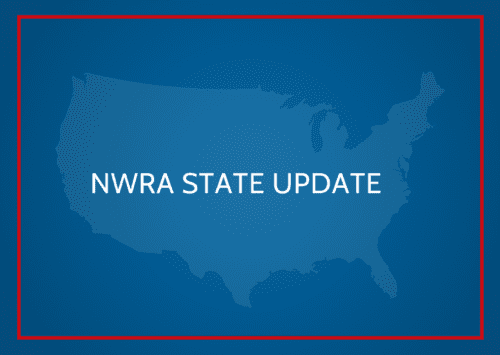NWRA State Update: NWRA’s Colorado Chapter Provides Weekly Roundup
The following is a weekly summary provided by NWRA Colorado chapter lobbyist Jep Seman with Colorado Advocates, Inc.
Transportation Funding Package
Democratic legislators and leadership announced the broad contours for their coming transportation funding package. Designed to generate nearly $5 billion during the next 10 years, many compared the package to the proverbial Christmas tree normally associated with the U.S. Congress (i.e., increased gasoline taxes and fees on Uber/Lyft, Amazon/deliveries and P2P car sharing/car rentals to generate funding for roads/highways, transit/multimodal and bicycles, reductions in transportation-related greenhouse gas emissions and funding for disproportionately impacted communities located near major highways and roads.)
Colorado Revenue Forecast
On March 19, legislators received the quarterly revenue forecast from legislative and administration economists. The March forecast is always critical as it becomes the basis for finalizing the coming state budget, which will be completed in the next two weeks. In summary, the forecast predicts a much-improving state economy and general fund revenue flows.
While unemployment remains stubbornly high (especially in the low wage job sector), revenue projections suggest $571 million in new revenue in the current year, $665 million next year and $825 million in 2022-23. This is encouraging news, but it’s qualified in two ways: 1) much of the increased saving and spending rates are tied to the federal stimulus program, which will run its course by the third quarter, and 2) increased revenue puts the state closer to the Referendum C spending cap, which triggers automatic taxpayer refunds.
The American Rescue Plan is also expected to provide another $5 billion to $7 billion in new spending for the state. Noteworthy, the forecast projects only $18.4 million in total severance tax collections for 2020-21 ($4.9 million from oil and gas), which is less than some individual companies once paid in a single year.
Public Health Insurance Option
On March 18, legislators announced HB21-1232, the long-anticipated public health insurance option legislation. This year’s approach is different from last year and is designed to give the healthcare industry a chance to reduce patient costs on its own. The proposal has two phases. In Phase 1, the state insurance commissioner will create a standard design for health insurance plans and determine features such as what services the plan will cover and associated deductibles.
If the healthcare industry can’t meet a 20 percent cost reduction goal, then the bill will move into Phase 2. Insurance companies will be required to set a goal of offering the standardized plan at a price at least 10 percent less than the premium rate they offered on the individual market in 2021. By the 2024 plan year, that reduction must jump to 20 percent less than 2021 prices for at least one plan in each county—though there are some exemptions for counties that have already achieved these savings.
Not surprisingly, hospitals and insurance interests are mobilizing to oppose the bill.
Supreme Court Decision
Colorado Republican legislators enjoyed a rare win on Monday when the court ruled that the use of automated reading machines by the Democratic majority leadership fails to satisfy the Colorado Constitutional requirement that legislators may request bills be read at length. Long a tool of the minority, in 2019, Republicans cried foul when leadership set multiple machine readers in motion to read a 2,000-page bill. The indecipherable cacophony resulted in a court challenge that landed in the Republicans’ favor. Going forward, all bills must be read by human readers at an understandable pace in order to comply with the Constitution.
Ballot Initiatives
While it remains early, we are beginning to hear rumors of ballot title filings for the November 2022 election cycle. This week, titles were filed by conservative groups to once again ask Colorado voters to reduce income tax rates. As you may recall, this was a successful ballot initiative during the 2020 cycle. These titles could be used as leverage against efforts to raise legislative fees and enterprises (see transportation package information above) but may also be proposed as reductions in their own right (with strong expectations that voters will gladly support such initiatives).
COVID-19 Response
This week, Colorado case rates are up slightly, hospitalizations have both increased and decreased, infectious positivity rates are down slightly and nearly 20 percent of the state’s eligible population are reported to have been vaccinated (with many more eligible starting today, including people aged 50 and older and restaurant and transportation sector employees).
There have been rumors that the governor is considering lifting the statewide mask mandate, and if this were to happen, it would be based on a date that’s certain and likely 30 or more days out from any announcement. We want to emphasize that this is only a rumor and could be wildly incorrect, but the rumor alone is noteworthy and indicative of improving pandemic conditions across the state.

